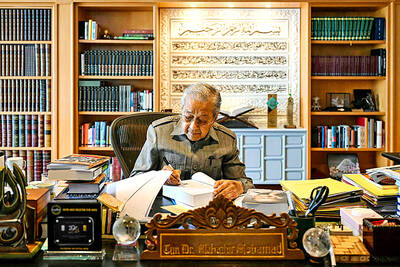Territorial disputes in the South China Sea are likely to drag on for decades, and mounting demand for resources could intensify them, experts said at a conference on the region that was to close yesterday.
The conference addressed one of the most sensitive political topics for Vietnam and other Southeast Asian countries. Territorial disputes between China and several Southeast Asian countries over the Spratly and Paracel Islands and wide areas of the ocean floor have led to diplomatic protests, seizures of fishing vessels and other conflicts.
“I think we just have to accept the fact that probably some conflicts are not meant to be solved within this lifetime,” said Nazery Khalid, a senior fellow at the Maritime Institute of Malaysia.
Khalid recommended that countries in the region concentrate on areas of mutual agreement, rather than points of conflict. But participants at the conference saw few areas of agreement, apart from cooperation in meteorology and search-and-rescue efforts.
China claims virtually all of the South China Sea, and its claims overlap with those of the Philippines, Vietnam, Malaysia, Indonesia, Taiwan and Brunei. Those countries’ claims also overlap in various areas.
The head of Vietnam’s Diplomatic Academy, Duong Van Quang, said at the opening of the conference that tensions had risen in part due to “attempts to assert legal claims over territory, in parallel with unilateral actions to strengthen control over terrain.”
Quang was referring to China’s recent establishment of a commune-level government on Woody Island, the largest of the Spratlys, which Chinese forces seized from the former South Vietnam in 1974 and which Hanoi still claims.
But international law professor Liu Nanlai (劉楠來)of China’s Academy for Social Sciences made no concessions to the Vietnamese view.
“There seems to be a misconception among many observers that China has taken islands from other countries in the Spratlys,” Liu said. “In fact, before the 1950s and [19]60s, no country other than China had made a claim in the Spratlys.”
Vietnam has recently suggested that ASEAN member states negotiate as a bloc to offset Chinese claims.
Mark Valencia of the US’ Nautilus Institute said such cooperation was unlikely, in part because China maneuvers to block it.
“All China needs to do is to peel off one [ASEAN] country and they won’t be able to move ahead as a bloc,” Valencia said. “So this will drag on indefinitely, in my view.”

A new online voting system aimed at boosting turnout among the Philippines’ millions of overseas workers ahead of Monday’s mid-term elections has been marked by confusion and fears of disenfranchisement. Thousands of overseas Filipino workers have already cast their ballots in the race dominated by a bitter feud between President Ferdinand Marcos Jr and his impeached vice president, Sara Duterte. While official turnout figures are not yet publicly available, data from the Philippine Commission on Elections (COMELEC) showed that at least 134,000 of the 1.22 million registered overseas voters have signed up for the new online system, which opened on April 13. However,

ALLIES: Calling Putin his ‘old friend,’ Xi said Beijing stood alongside Russia ‘in the face of the international counter-current of unilateralism and hegemonic bullying’ Chinese President Xi Jinping (習近平) yesterday was in Moscow for a state visit ahead of the Kremlin’s grand Victory Day celebrations, as Ukraine accused Russia’s army of launching air strikes just hours into a supposed truce. More than 20 foreign leaders were in Russia to attend a vast military parade today marking 80 years since the defeat of Nazi Germany in World War II, taking place three years into Russia’s offensive in Ukraine. Putin ordered troops into Ukraine in February 2022 and has marshaled the memory of Soviet victory against Nazi Germany to justify his campaign and rally society behind the offensive,

CONFLICTING REPORTS: Beijing said it was ‘not familiar with the matter’ when asked if Chinese jets were used in the conflict, after Pakistan’s foreign minister said they were The Pakistan Army yesterday said it shot down 25 Indian drones, a day after the worst violence between the nuclear-armed rivals in two decades. Pakistani Prime Minister Shehbaz Sharif vowed to retaliate after India launched deadly missile strikes on Wednesday morning, escalating days of gunfire along their border. At least 45 deaths were reported from both sides following Wednesday’s violence, including children. Pakistan’s military said in a statement yesterday that it had “so far shot down 25 Israeli-made Harop drones” at multiple location across the country. “Last night, India showed another act of aggression by sending drones to multiple locations,” Pakistan military spokesman Ahmed

Former Malaysian prime minister Mahathir Mohamad is giving US President Donald Trump three months before his fellow Americans force him to rethink his stringent global tariff strategy, accusing the US leader of “living in an old world.” In an interview two months ahead of his 100th birthday, the plain-speaking Mahathir said: “Trump will find that his tariffs are hurting America, and the people in America will end up against him.” The US president’s stop-start tariff rollout would impact Asian nations hard, including Malaysia, which faces a 24 percent levy in July unless the two countries can strike a deal. “It’s going to cause